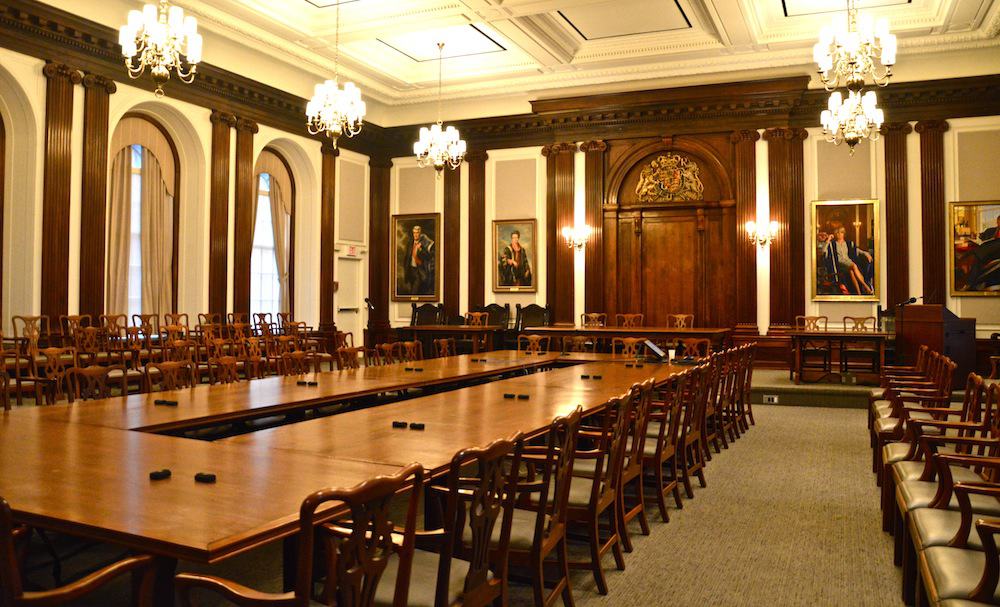Elections for the University of Toronto’s Governing Council and Academic Board are underway, and the competition is fierce.
There are a total of 16 candidates running for just four full-time undergraduate spots in two constituencies — a decrease from last year’s 21 candidates.
Ten students are competing for two Faculty of Arts & Science representative seats, while six are vying for two professional faculty representative spots.
Four full-time undergraduate seats, two part-time undergraduate seats, and two graduate seats comprise the eight student spaces on Governing Council. With the two part-time undergraduate seats filled by acclamation by Susan Froom and Ray Khan, U of T students have four more decisions to make.
 The campaign period began on January 26, and many candidates have opted to create websites and Facebook pages to advertise their candidacy. This year, most candidates have focused their goals on improving overall student life by acquiring more funding for student clubs and academic opportunities and by fostering a better integration of student life across all three campuses at U of T.
The campaign period began on January 26, and many candidates have opted to create websites and Facebook pages to advertise their candidacy. This year, most candidates have focused their goals on improving overall student life by acquiring more funding for student clubs and academic opportunities and by fostering a better integration of student life across all three campuses at U of T.
“I think it’s somewhat ridiculous that there is a bus from the Mississauga-St. George shuttle but not one to Scarborough,” says Sasha Boutilier in his candidate statement. Boutilier is running to represent undergraduates in Arts & Science.
Boutilier currently serves as the co-president of AFTER (Applications For Tertiary Education Realized) UofT, a club that hosts academic panels and alumni exchanges. Boutilier believes that the university should make a greater effort to allow collaboration between various programs and opportunities hosted on each campus so that students will no longer be restricted in program choice solely by virtue of which campus they are at.
Boutilier is carrying out a joint campaign with Victoria Wicks. Together, Boutilier and Wicks wish to create a more equitable campus by tackling issues such as integration, fossil fuel divestment, and sexual violence. “I am particularly invested in social justice,” says Wicks, a member of the U of T Student Coalition Against Sexual Violence, adding, “As student governor, then, I plan to keep our administration active and accountable on these issues,” she adds.
Aditya Chawla, a fellow Arts & Science candidate, shares Boutilier’s goal for better student life. “I aim to make decisions that directly benefit undergraduate students as soon as possible,” he says, specifying his support for better funding for student clubs and academic and international opportunities.
Connor Anear, co-head of college at Trinity College, lists student society policies, the Student Commons, mental health initiatives, lobbying for international student seats on Governing Council and fossil fuel divestment, and inter-campus transit among his priorities.
Anear notes that there has been significant progress on these issues. “Thus, I think it’s important that we take advantage of the building momentum and follow through by creating the best possible solutions,” he says.
Susan Cui, who serves as president of UFOLD (Fly with Origami, Learn to Dream), a U of T origami club, names advocating for a decrease in tuition fee interest and lobbying for international student seats on Governing Council as her top two priorities.
“The University should not be making commercial bank line of credit level interests off its relatively impoverished students who are unable to pay the full amount of their tuition before November of each year,” she says in her candidate statement.
Dalal Badawi, an Arts & Science candidate, aims to improve connectivity between students and the Governing Council. “I…intend on creating a page that students can follow that will contain summaries of Governing Council meetings so that students can be well aware of all of the proceedings and decision making processes,” Badawi says in her candidate statement.
Marc Marlo Laurin, Kristian Koschany, Lawrence Zhang, and Ridwan Olow, the remaining four candidates for Arts & Science seats, have also dedicated themselves to making Governing Council’s process more transparent if elected.
Faizan Akbani and Mathias Memmel, hoping to represent students in the professional faculties, are running a campaign in tandem. “We believe that receiving notifications once a year about the Governing Council is unacceptable,” they say in a joint statement, continuing, “We wish to empower Pro-facs [sic] to be involved in the decision making process and increase accessibility of information.”
Avineet Randhawa, a second-year chemical engineering student, strongly advocates for an “integrated student experience” — a goal expressed by many of the candidates. “As much fun as faculty rivalries are, I would love to see and will advocate for more interfaculty involvement not only in university policy-making but also throughout campus in general,” he says.
Andrew Watt and Vikki Bekiaris, also running for the professional faculties seats, aim to further enhance the social and academic policies provided by the university and act as the means through which the student body can be accurately represented at the council.
Riaz Sayani-Mulji, a professional faculties candidate, has focused on student mental health and sexual violence as some of his main platform points.
Web-based and mail ballot voting will begin on February 9 and end on February 20. Preliminary election results are slated to be announced on February 24, and winners declared by February 27.
Governing Council, the university’s highest decision-making body, is composed of 50 members, including eight alumni and eight students.
Editor’s note: Victoria Wicks was formerly an associate comment editor with The Varsity. Aditya Chawla is a Varsity staff writer.


